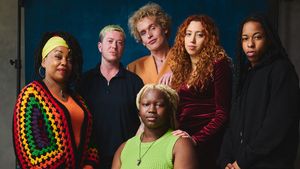Treatment GuideJust DiagnosedSex & DatingAfrican AmericanStigmaAsk the HIV DocPrEP En EspañolNewsVoicesPrint IssueVideoOut 100
CONTACTCAREER OPPORTUNITIESADVERTISE WITH USPRIVACY POLICYPRIVACY PREFERENCESTERMS OF USELEGAL NOTICE
© 2025 Pride Publishing Inc.
All Rights reserved
All Rights reserved
Scroll To Top
By continuing to use our site, you agree to our Privacy Policy and Terms of Use.
Having had some success dispelling the myth that the blood of virgins cures AIDS, Zimbabwean Betty Makoni is now also fighting what she calls a root cause of the disease--poverty. 'Many girls don't have anything to eat or drink. Then a sugar daddy comes and says, 'If you have sex with me, I will give you money,' and they are likely to take the money and get infected with HIV,' the founder of the nonprofit antirape group the Girl Child Network says. Zimbabwe's AIDS rate and poverty levels make Makoni's job no easy task. The country has one of the weakest economies in the world. Fewer than one in four citizens have jobs, and the inflation rate is the world's highest, hitting 7,600% in July. One in five adults has AIDS, according to the United Nations, a level that has helped sink the country's average life expectancy into the 30s, from nearly 60 in 1990. Girls and women are far more likely to have the disease than men. Makoni, who herself was raped at an early age, formed the Girl Child Network in 1998. A former schoolteacher, she was moved when two thirds of her girl pupils had left class by the end of the year because they got AIDS, were married away to members of religious sects, or had to return to work in their homes. 'Betty inspires these girls to do work I haven't seen in any other country,' says Paola Gianturco, author of the book Women Who Light the Dark, published in September by PowerHouse books, in which Makoni is featured. The Girl Child Network now operates in the majority of Zimbabwe's rural districts--with 450 clubs serving 30,000 girls--and is beginning to expand into nearby countries. The network fights rape by empowering girls and keeping them in school. Thousands of girls have been given underwear by Girl Child Network on which parts of national sexual violence laws have been written so that they know when their rights have been violated. She counts the village of Rusape as one of her successes. In 2000 there were 200 rapes reported there; now there are none, she says. The myth that the blood of virgins mixed with herbs kills AIDS, she says, has been wiped out in Rusape. But in other regions of the country the myth remains strong. Men collect the blood either after breaking girls' hymens or after cutting their breasts--wounds that often end up killing them--and use it themselves or sell it to men who have AIDS. Time has taught Makoni to fight AIDS from all sides. 'At the beginning we were not trying to fight poverty,' she says. 'We thought there was a problem with attitudes, beliefs, and practices, but poverty can worsen AIDS.' She helps give girls school basics because without education a girl is nothing, she says. She adds that empowerment from education can help girls resist male attacks, early marriage, and religious sects that perform illegal virginity testing. Girl Child Network supplies girls with food, drink, a school uniform, and pens and paper. 'You can't empower yourself on an empty stomach,' she says. The network also directs some donations into buying the girls sanitary pads--which are rare in the country. Many Zimbabwean girls are not allowed to go to school for up to five days a month when they menstruate, and difficulties from the lost days can make them drop out. Makoni says sewing machines help them make pads out of cloth and keep girls in school. The girls' clubs also raise money for education by growing vegetables, which they can also eat, or holding dances. (AP)
From our Sponsors
Most Popular
Lexi Love comes out as HIV+ after Trump deletes federal resources
January 23 2025 11:23 AM
Grindr is reminding us why jockstraps are so sexy and iconic
May 02 2025 5:36 PM
BREAKING NEWS: Trump admin moves to end federal HIV prevention programs
March 18 2025 6:10 PM
Trump's orders prompt CDC to erase HIV resources
January 31 2025 5:29 PM
Celebrating Black History Month with our annual African American issue
February 01 2025 3:28 PM
Tyler TerMeer vows to continue to fight for health care for all
January 28 2025 3:00 PM
Discover the power of Wellness in your life
March 26 2025 12:41 PM
Plus: Featured Video
Latest Stories
Dancer. Healer. Survivor. DéShaun Armbrister is all of the above
July 02 2025 8:23 PM
Two right-wing Supreme Court justices signal they may uphold access to PrEP and more
April 21 2025 4:10 PM
Broadway's best raise over $1 million for LGBTQ+ and HIV causes
April 03 2025 7:15 PM
Plus nominated for 2025 GLAAD Media Award
January 22 2025 12:42 PM
'RuPaul's Drag Race' star Trinity K Bonet quietly comes out trans
December 15 2024 6:27 PM
AIDS Memorial Quilt displayed at White House for the first time
December 02 2024 1:21 PM
BREAKING: Supreme Court rules to save free access to preventive care, including PrEP
June 27 2025 10:32 AM
1985: the year the AIDS crisis finally broke through the silence
June 26 2025 11:24 AM
Trump admin guts $258 million in funding for HIV vaccine research
June 03 2025 3:47 PM
500,000 Children at Risk: PEPFAR Funding Crisis
April 08 2025 3:51 PM
The Talk Season 5 premieres this spring with HIV guidance for the newly diagnosed
March 26 2025 1:00 PM
Jess King is here to help you live your happiest, healthiest life yet
March 24 2025 4:35 PM
A camp for HIV-positive kids is for sale. Here's why its founder is celebrating
January 02 2025 12:21 PM
VIDEO: A man living with HIV discusses his journey to fatherhood
June 10 2025 4:58 PM
HRC holds 'die-in' to protest Trump health care cuts
April 28 2025 2:11 PM
Season 4 of The Switch on resilience & radical self-love returns this spring
March 26 2025 12:20 PM
Gerald Garth is keeping people of color happy and healthy through trying times
March 11 2025 3:38 PM
This long-term HIV survivor says testosterone therapy helped save his life.
December 16 2024 8:00 PM
Ricky Martin delivers showstopping performance for 2024 World AIDS Day
December 05 2024 12:08 PM
Trending stories
Recommended Stories for You














































































